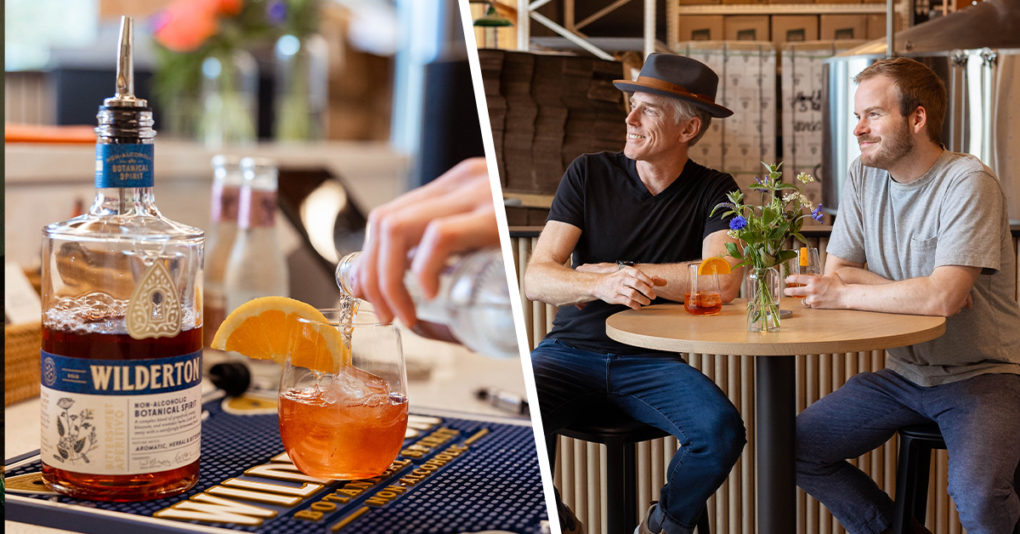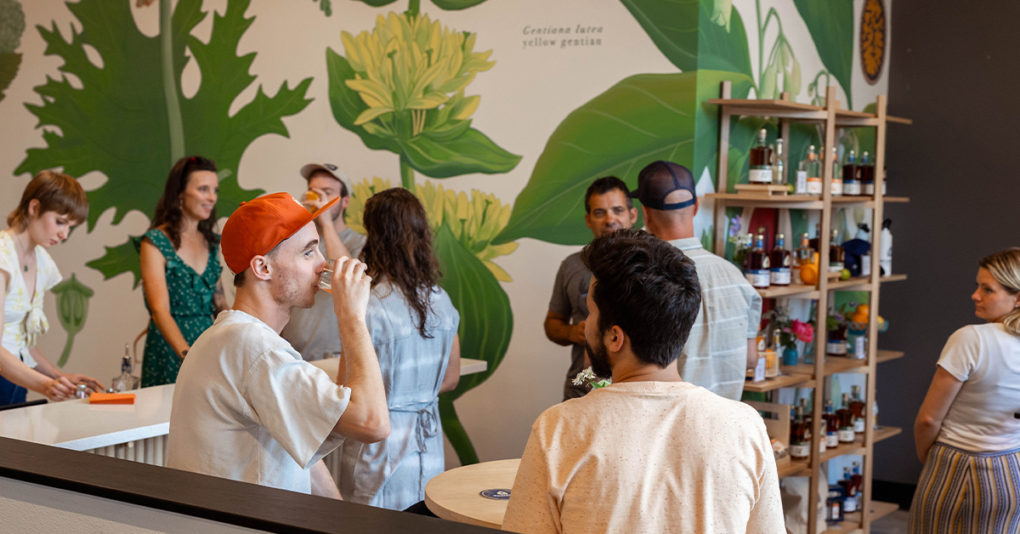
“Opening the tasting room and the distillery is the single best decision we made in the four years the business has been around,” co-founder and CEO Brad Whiting told BevNET last week.
While streamlining operations for the company, the new hub has also provided a place of discovery for sober curious consumers and the industry.
Founded by craft spirits veterans Whiting and Seth O’Malley, Wilderton launched in December 2020 with three signature expressions that are distilled using globally sourced wild plants. Rather than creating a direct spirit replacement, the founders hedged their bets on offering a unique addition to the budding non-alc movement. But that route has created some complexities for the consumer.
“If the bottle says ‘non-alc gin,’ at least they know to put it with tonic,” he said.
Wilderton’s line, which is flavor and color coded to traditional spirit categories but not specific types, requires more guidance for consumers and professional mixologists wading into zero-proof cocktails. After conducting 1,600 tasting flights and tours since opening its doors in July, the founders argue that offering visitors a glimpse of the production process alongside flights and cocktail lessons has helped them create an in-person experience that furthers their mission to instill the same level of craft, story and credibility in non-alc spirits as their full proof counterparts.
A vision of founders and investors since launch, Wilderton’s 4,000 square-foot distillery stands on the waterfront in Hood River, Oregon amidst a slew of other local distilleries and breweries, creating an “anchor of what we believe non-alc can be in a place where people would literally trip over it while in a drinking experience state of mind,” said Whiting. Now, with the demand for more labeling and additive-free spirits potentially bleeding into non-alc, a tasting room embedded into a production facility surrounded by glass windows represents the transparency that its founders hope will keep them ahead of the curve.
The team hired a hospitality manager to design the tastings and tours centered on welcoming guests new to non-alc, and trained three staff members to cover the tourist season from April to September. The small space features a few tables outside, hightops and four bar stools, fitting about 15 people at a time. Tours were initially free and are now $10, with more in-depth experiences available.
As the season winds down, the founders are evaluating opening hours. Whiting predicts that 95% of their guests were unaware of non-alc spirits, and tracked 60% leaving with purchases.
In a time when new entrants into the category are giving consumers more options, Whiting is hopeful that the social content generated by the distillery translates to brand loyalty.
“The amount of user generated content that was created by folks that showed up there, the amount of traffic through social tied to the distillery and the comments that we got from that, are the most tangible evidence that that in fact, this is giving people something beyond the liquid and becoming part of their life,” he said.
The distillery has also provided a hub for educating distributors, retailers and bartenders, providing a natural educational evolution those parties are accustomed to with a craft spirit. As non-alc products are produced in various non-traditional methods, such as compounded at a manufacturing plant versus distilled at one source, for now the Wilderton distillery remains a novelty experience for bartenders from among its 300 on-premise accounts across the Pacific Northwest.
“There’s just a lot of understanding that takes place in this environment that we really weren’t able to do just by talking and just by having a slide deck,” said O’Malley.
With West Coast tourists making up the bulk of Wilderton’s visitors, the founders are betting on the distillery building demand as the brand expands out of Oregon and Washington and into California this year. They’ve secured some iconic accounts so far, like Trick Dog in San Francisco and Death & Co in Los Angeles, and hit the shelves of Whole Foods and Total Wine & More. While on-premise is typically still a main point of discovery for most new spirit brands, the distillery could add one more.
“Our hope is that that continues to reinforce the circle of finding out about it here, then trying it at a bar, and then going to a retailer and finding it on the shelf,” said Whiting.
